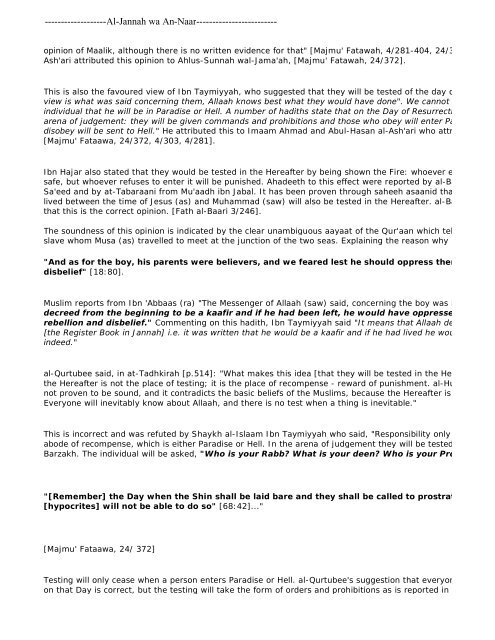Create successful ePaper yourself
Turn your PDF publications into a flip-book with our unique Google optimized e-Paper software.
-------------------Al-Jannah wa An-Naar-------------------------<br />
opinion of Maalik, although there is no written evidence for that" [Majmu' Fatawah, 4/281-404, 24/372] <strong>and</strong> Ab<br />
Ash'ari attributed this opinion to Ahlus-Sunnah wal-Jama'ah, [Majmu' Fatawah, 24/372].<br />
This is also the favoured view of Ibn Taymiyyah, who suggested that they will be tested of the day of Resurrec<br />
view is what was said concerning them, Allaah knows best what they would have done". We cannot say of any<br />
individual that he will be in <strong>Paradise</strong> or <strong>Hell</strong>. A number of hadiths state that on the Day of Resurrection they wi<br />
arena of judgement: they will be given comm<strong>and</strong>s <strong>and</strong> prohibitions <strong>and</strong> those who obey will enter <strong>Paradise</strong>, wh<br />
disobey will be sent to <strong>Hell</strong>." He attributed this to Imaam Ahmad <strong>and</strong> Abul-Hasan al-Ash'ari who attributed it to<br />
[Majmu' Fataawa, 24/372, 4/303, 4/281].<br />
Ibn Hajar also stated that they would be tested in the Hereafter by being shown the Fire: whoever enters it wil<br />
safe, but whoever refuses to enter it will be punished. Ahadeeth to this effect were reported by al-Bazzar from<br />
Sa'eed <strong>and</strong> by at-Tabaraani from Mu'aadh ibn Jabal. It has been proven through saheeh asaanid that the insan<br />
lived between the time of Jesus (as) <strong>and</strong> Muhammad (saw) will also be tested in the Hereafter. al-Bayhaqee st<br />
that this is the correct opinion. [Fath al-Baari 3/246].<br />
The soundness of this opinion is indicated by the clear unambiguous aayaat of the Qur'aan which tells the story<br />
slave whom Musa (as) travelled to meet at the junction of the two seas. Explaining the reason why he killed th<br />
"And as for the boy, his parents were believers, <strong>and</strong> we feared lest he should oppress them by rebe<br />
disbelief" [18:80].<br />
Muslim reports from Ibn 'Abbaas (ra) "The Messenger of Allaah (saw) said, concerning the boy was killed by al<br />
decreed from the beginning to be a kaafir <strong>and</strong> if he had been left, he would have oppressed his pare<br />
rebellion <strong>and</strong> disbelief." Commenting on this hadith, Ibn Taymiyyah said "It means that Allaah decreed it in<br />
[the Register Book in Jannah] i.e. it was written that he would be a kaafir <strong>and</strong> if he had lived he would have be<br />
indeed."<br />
al-Qurtubee said, in at-Tadhkirah [p.514]: "What makes this idea [that they will be tested in the Hereafter] we<br />
the Hereafter is not the place of testing; it is the place of recompense - reward of punishment. al-Hulaymee sa<br />
not proven to be sound, <strong>and</strong> it contradicts the basic beliefs of the Muslims, because the Hereafter is not the pla<br />
Everyone will inevitably know about Allaah, <strong>and</strong> there is no test when a thing is inevitable."<br />
This is incorrect <strong>and</strong> was refuted by Shaykh al-Islaam Ibn Taymiyyah who said, "Responsibility only ceases whe<br />
abode of recompense, which is either <strong>Paradise</strong> or <strong>Hell</strong>. In the arena of judgement they will be tested just as the<br />
Barzakh. The individual will be asked, "Who is your Rabb? What is your deen? Who is your Prophet?"<br />
"[Remember] the Day when the Shin shall be laid bare <strong>and</strong> they shall be called to prostrate to Allaa<br />
[hypocrites] will not be able to do so" [68:42]..."<br />
[Majmu' Fataawa, 24/ 372]<br />
Testing will only cease when a person enters <strong>Paradise</strong> or <strong>Hell</strong>. al-Qurtubee's suggestion that everyone will inev<br />
on that Day is correct, but the testing will take the form of orders <strong>and</strong> prohibitions as is reported in a number o














